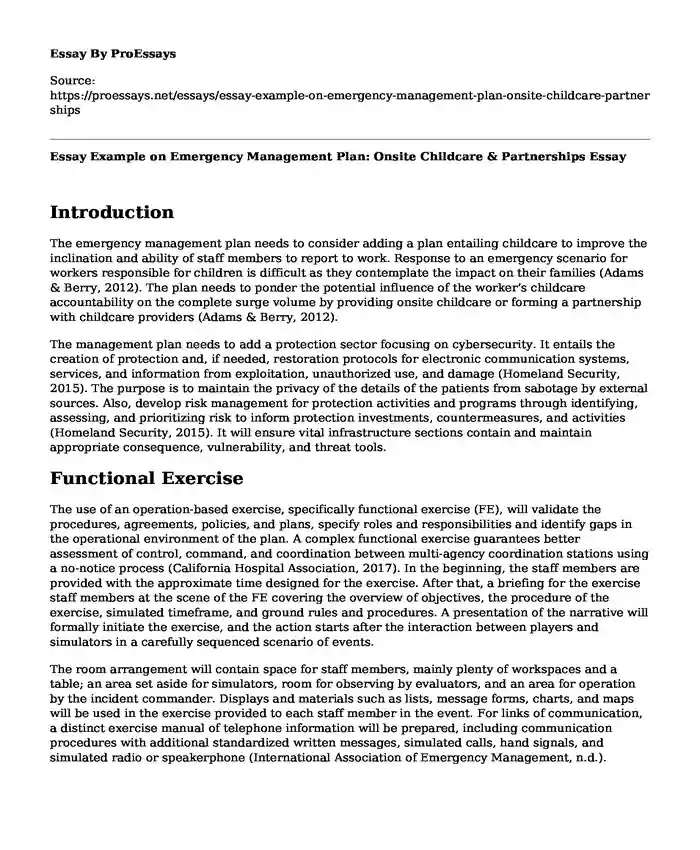Introduction
The emergency management plan needs to consider adding a plan entailing childcare to improve the inclination and ability of staff members to report to work. Response to an emergency scenario for workers responsible for children is difficult as they contemplate the impact on their families (Adams & Berry, 2012). The plan needs to ponder the potential influence of the worker’s childcare accountability on the complete surge volume by providing onsite childcare or forming a partnership with childcare providers (Adams & Berry, 2012).
The management plan needs to add a protection sector focusing on cybersecurity. It entails the creation of protection and, if needed, restoration protocols for electronic communication systems, services, and information from exploitation, unauthorized use, and damage (Homeland Security, 2015). The purpose is to maintain the privacy of the details of the patients from sabotage by external sources. Also, develop risk management for protection activities and programs through identifying, assessing, and prioritizing risk to inform protection investments, countermeasures, and activities (Homeland Security, 2015). It will ensure vital infrastructure sections contain and maintain appropriate consequence, vulnerability, and threat tools.
Functional Exercise
The use of an operation-based exercise, specifically functional exercise (FE), will validate the procedures, agreements, policies, and plans, specify roles and responsibilities and identify gaps in the operational environment of the plan. A complex functional exercise guarantees better assessment of control, command, and coordination between multi-agency coordination stations using a no-notice process (California Hospital Association, 2017). In the beginning, the staff members are provided with the approximate time designed for the exercise. After that, a briefing for the exercise staff members at the scene of the FE covering the overview of objectives, the procedure of the exercise, simulated timeframe, and ground rules and procedures. A presentation of the narrative will formally initiate the exercise, and the action starts after the interaction between players and simulators in a carefully sequenced scenario of events.
The room arrangement will contain space for staff members, mainly plenty of workspaces and a table; an area set aside for simulators, room for observing by evaluators, and an area for operation by the incident commander. Displays and materials such as lists, message forms, charts, and maps will be used in the exercise provided to each staff member in the event. For links of communication, a distinct exercise manual of telephone information will be prepared, including communication procedures with additional standardized written messages, simulated calls, hand signals, and simulated radio or speakerphone (International Association of Emergency Management, n.d.).
Conclusion
To manage the action, the incident commander monitors the interaction and progress as the players and simulators transmit messages and respond to them. Also, the incident commander adjusts the pace through modifying the flow of messages, slowing the pace if too frantic, and speeding it up when it drags (International Association of Emergency Management, n.d.). More so, they handle time skips transitions and prepare updates of transition to be giving to the staff members before resuming the exercise. The simulators update the displays of simulations reflecting the outcome of staff members’ actions and the previous events. The exercise of the operation is undertaken at Great Plains community health center.
References
Adams, L. M., & Berry, D. (2012). Who Will Show Up? Estimating Ability and Willingness of Essential Hospital Personnel to Report to Work in Response to a Disaster. Online Journal of Issues in Nursing, 17(2).
California Hospital Association. (2017). Types of exercises. Emergency Preparedness. https://www.calhospitalprepare.org/post/types-exercises
Homeland Security. (2015). National Preparedness Goal (2nd ed.). FEMA: Department of Homeland Security. https://www.fema.gov/media-library-data/1443799615171-2aae90be55041740f97e8532fc680d40/
National_Preparedness_Goal_2nd_Edition.pdfInternational Association of Emergency Management. (n.d.). The Functional Exercise. In Exercise Design. http://www.iaem.com/documents/Exercise%20Design-IS-139-continued.pdf
Cite this page
Essay Example on Emergency Management Plan: Onsite Childcare & Partnerships. (2023, Sep 10). Retrieved from https://proessays.net/essays/essay-example-on-emergency-management-plan-onsite-childcare-partnerships
If you are the original author of this essay and no longer wish to have it published on the ProEssays website, please click below to request its removal:
- Research Paper Example: Hospital Federal Regulation
- Adherence in Diabetes Patients Assignments Paper Example
- Foundation of Medicine County Herbs Apothecary
- Essay Example on Diagnosing Burns: Possible Health Disorders
- Abortion: A Controversial Issue Open to Debate and Discussion - Essay Sample
- Paper Example on Granny's Got Game: Uplifting Old-Age Tales of Basketball Teams
- Free Essay on Navigating the Opioid Crisis: Impacts, Responses, and Future Directions in America







